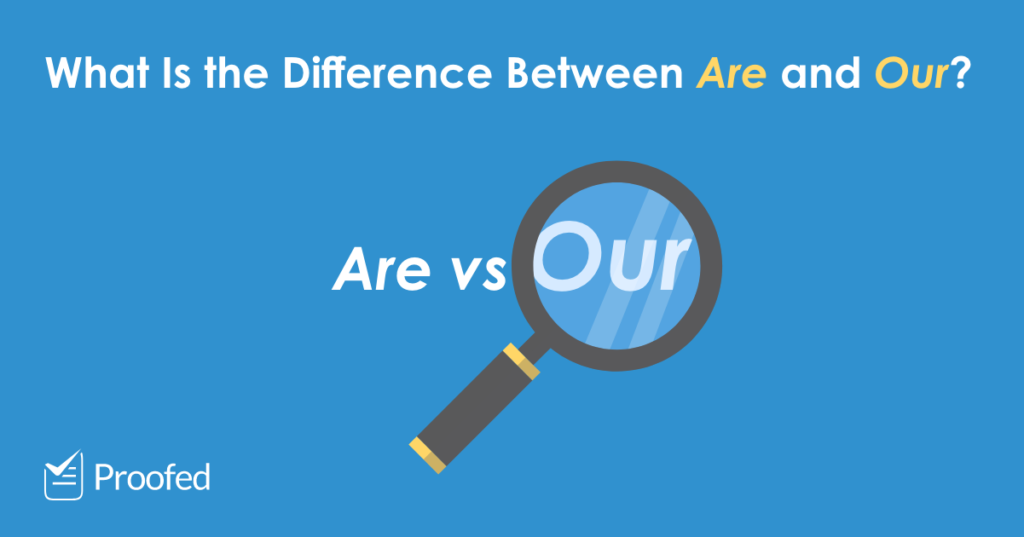The words ‘are’ and ‘our’ can be confusing, especially if you speak English as an additional language. These terms are common in writing and sound similar when spoken, so it is easy to get them confused. But they also play very different grammatical roles in practice:
- Are is the present tense plural and second-person singular form of ‘be’.
- Our is a plural possessive determiner that means ‘belonging to us’.
For more advice on how to use these terms, check out our tips below.
Are (Present Tense of the Verb ‘Be’)
The verb ‘be’ – which refers to the ‘being’ of a thing or state – has several forms depending on various factors. You can see these variations below:
|
Verb Forms |
First Person |
Second Person |
Third Person |
|||
|
Singular |
Plural |
Singular |
Plural |
Singular |
Plural |
|
|
Present Tense |
Am |
Are |
Are |
Is |
Are |
|
|
Past Tense |
Was |
Were |
Were |
Was |
Were |
|
|
Present Participle |
Being |
|||||
|
Past Participle |
Been |
|||||
As you can see, then, we use the ‘are’ form in the following situations:
Find this useful?
Subscribe to our newsletter and get writing tips from our editors straight to your inbox.
- The second-person singular present tense (e.g. ‘You are a proofreader’).
- All plural simple present tense forms (e.g. ‘We are proofreaders’, ‘You are proofreaders’, ‘They are proofreaders’, ‘My sisters are proofreaders’).
We can also use ‘are’ to ask questions in these tenses:
Are you a proofreader?
Are they proofreaders?
In all cases, though, ‘are’ is always a verb that indicates a state of being.
Our (Belonging to Us)
‘Our’ is a first-person plural possessive determiner. It works as an adjective, modifying a noun to show that something belongs to an ‘us’. For example:
Our proofreading services will impress you.
By using ‘our’ to modify ‘proofreading services’ here, we show we’re discussing the services we provide (not proofreading services in general).
A variation on this word is ‘ours’, which is an absolute possessive. This means it stands by itself rather than modifying a noun. For example, we might say:
The document is ours to proofread!
The ‘ours’ here still indicates ownership by a ‘we’ or ‘us’, though.
Summary: Are vs. Our
‘Are’ and ‘our’ may sound similar, but they play different roles in language:
- Are is the second-person singular present tense (i.e. ‘You are’) and plural present tense (i.e. ‘We are’, ‘You are’, ‘they are’, etc.) form of the verb ‘be’.
- Our is a first-person plural possessive determiner, meaning ‘belonging to us’.
As long as you remember that ‘are’ is a verb and ‘our’ is a pronoun, it should be easy to avoid mixing them up. But if you’d like a helping hand with your spelling and grammar, or simply a final check on a document to make sure it is error free, why not try our expert proofreading services today?
